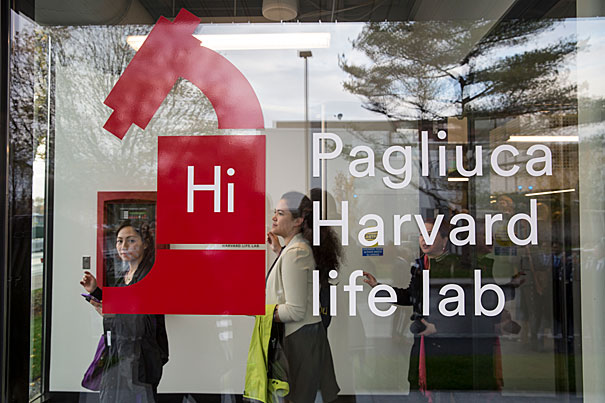
The newly opened Pagliuca Harvard Life Lab offers shared space for high-potential life sciences and biotech startups that are founded by Harvard faculty, alumni, students, and postdoctoral scholars.
Jon Chase/Harvard Staff Photographer
Life Lab builds on cross-disciplinary approach
New lab joins growing cluster of innovation facilities in Allston
Hundreds of people from across the University and its surrounding communities attended the grand opening of the Pagliuca Harvard Life Lab in Allston last week.
The Life Lab is the newest addition to the growing portfolio of innovation facilities on Western Avenue. It joins the Harvard Innovation Lab (i-lab), which opened in 2011, and the Harvard Launch Lab, an alumni startup community and co-working facility that opened in 2014.
Image gallery
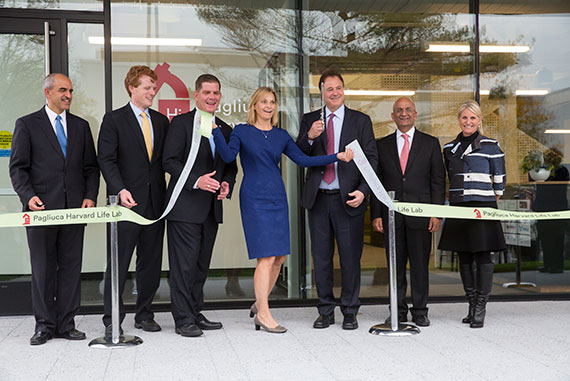
Life Lab Grand opening in Allston. Ribbon cutting, l to r: Srikant Datar, Senior Associate Dean for University Affairs, HBS; Congressman Joseph P. Kennedy III, D-Mass; Boston Mayor Marty Walsh; Judy Pagliuca and her husband Stephen, Boston Celtics owner and both Life Lab donors; Nitin Nohria, Dean, Harvard Business School; and Jodi Goldstein, Managing Director of the Harvard Innovation Labs. Jon Chase/Harvard Staff Photographer
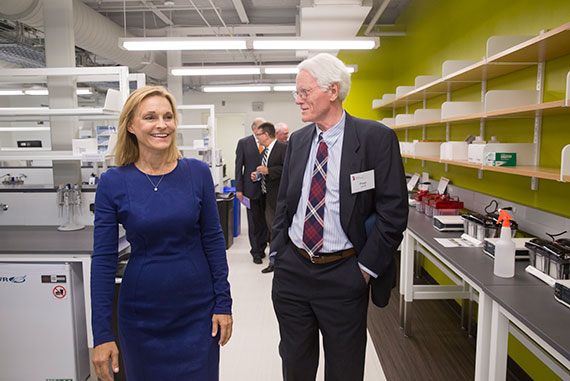
Life Lab Grand opening in Allston. Juicy Pagliuca, HBS ’83 and wife of Stephen Pagliuca, tours the second floor of the Life Lab with former Fidelity Magellan Fund director Peter Lynch. Jon Chase/Harvard Staff Photographer
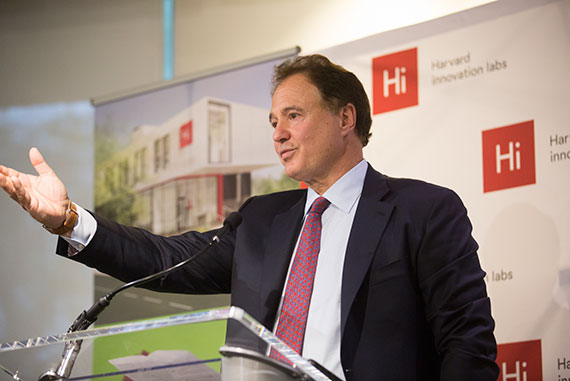
Life Lab Grand opening in Allston. Stephen Pagliuca, Boston Celtics owner and Life Lab donor, address the audience. Jon Chase/Harvard Staff Photographer
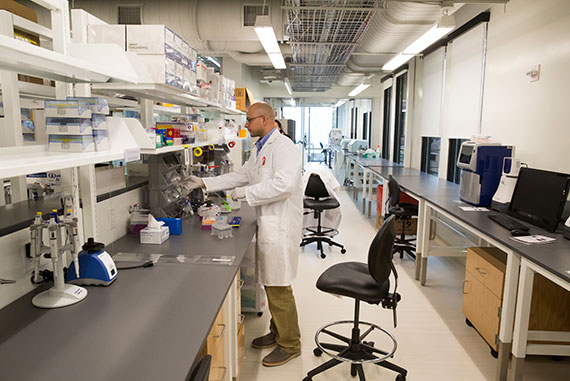
Life Lab Grand opening in Allston. Nick Renzette, a technology specialist with Aldatu, works in the Life Lab. Jon Chase/Harvard Staff Photographer
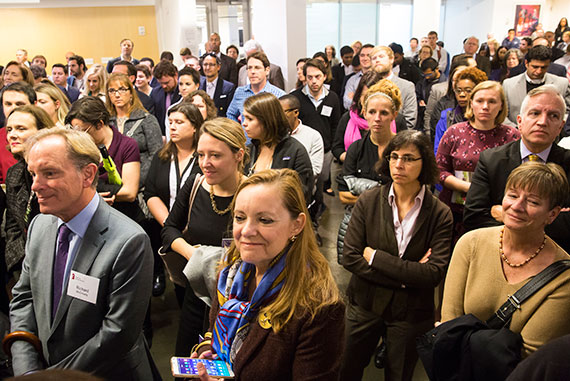
Life Lab Grand opening in Allston. The audience listens to Boston Mayor Marty Walsh. Jon Chase/Harvard Staff Photographer
All three labs benefit from their proximity to Harvard Business School (HBS) and the Science and Engineering Complex, which will be the new home of the Harvard John A. Paulson School of Engineering and Applied Sciences (SEAS) in 2020.
The Innovation Labs cluster will foster a cross-disciplinary approach to entrepreneurship that will enable deeper impact and outcomes, addressing questions whose complexity demands forging new connections and crossing traditional boundaries, noted President Drew Faust at the launch of Harvard’s Capital Campaign.
Over the past five years the i-lab has attracted students and faculty from across the University, some of whom want to pursue ideas in the life sciences that require wet lab facilities. Wet labs test chemicals, drugs, or other materials that require direct ventilation and specialized accommodations.
The newly opened Life Lab offers shared space for high-potential life sciences and biotech startups that are founded by Harvard faculty, alumni, students, and postdoctoral scholars. It provides learning and career development opportunities to Harvard students, equips scientific startups with the lab resources and programming needed to grow and scale life science ventures, and generates insights and expertise about what it will take for Harvard to continue to build a successful life science environment.
“The Life Lab is a vital building block in Harvard’s efforts to create an innovation hub in Allston that encourages our students and faculty to explore and nurture ideas that lead to new knowledge, new products, new services, and perhaps even new industries,” said Faust.
“The Pagliuca Harvard Life Lab is going to open new doors for students, faculty, scientists, and scholars. It will give them the platform to launch new biotech startups, and be an engineer for health care and the environment and it’s all right here in Allston,” said Boston Mayor Martin J. Walsh. “We are in the midst of a startup boom and this facility is going to really help attract more talent to our great city.”
Harvard in Allston: Life Lab
The lab was made possible by a gift from Judy and Stephen Pagliuca. Stephen Pagliuca is best known as a board member of the Boston Basketball Partners LLC, owner of the Boston Celtics.
“We believe innovation in the life sciences is critically important to the future of our region from an economic standpoint and equally important to all of our futures in its potential to solve complex health problems,” said Stephen Pagliuca.
“We are thrilled to be able to contribute to the innovation movement at Harvard and we are excited at the potential of the ideas that will emerge from this new space,” added Judy Pagliuca.
“We are so very grateful to Judy and Steve for their gift that made this project possible,” said Harvard Business School Dean Nitin Nohria. “And we are equally grateful for their vision of having Allston become a life sciences cluster and their understanding of the need for lab space to support Boston as a hub for biotechnology ventures.”
The 15,000-square-foot facility has a fully equipped and permitted laboratory and also hosts office space for early stage companies. It is a BSL1-rated facility, meaning that teams will work with materials that pose no danger to anyone outside of the lab. The Life Lab is operated by Lab Central, a leader in life sciences co-working communities.
The Life Lab selection committee has chosen 17 high-potential ventures founded and led by Harvard faculty, students, postdoctoral scholars, and alumni. Ventures are typically comprised of two to five individuals who demonstrate expertise in the technology or science, as well as an understanding of the commercial and market needs, and a vision for how they will build a viable business. The ventures represent eight Harvard Schools and nearly 50 percent have a female founder.
According to Jodi Goldstein, the Bruce and Bridgitt Evans Managing Director of the Harvard Innovation Labs, the inaugural teams reflect the breadth and diversity of Harvard. “We hope by building community we will accelerate their development and increase their likelihood of future success and ultimate impact on the world,” she said.
Day Zero Diagnostics is one of the inaugural ventures working at the new Life Lab. Miriam Huntley, one of its founders, said the company is working on saving time, money, and lives by developing new diagnostic tests that will cut the waiting time for results from days to mere hours. She said her team appreciates, and has come to rely upon, opportunities to collaborate not just with each other, but with other startups, and students from across the University.
“The i-lab and the Life Lab offer really unique opportunities; already we see a lot of flow between all of the labs, and between HBS and SEAS itself. It is a great community of people working together on different ventures,” said Huntley.
Michael Schrader, one of the co-founders of Vaxess, another company selected for the first round of Life Lab ventures, agrees.
“Cambridge, Harvard, Boston [are] just bubbling with these really, really cool technologies and looking for entrepreneurs to take them forward,” he said. “We [at Vaxess] have grown up in the incubator system, and we simply love it. We love the openness and support network that comes from it.
“Part of the challenge of starting a company is that you’re never going to have all the resources that you need,” continued Schrader. “For us to be at the Life Lab expands exponentially the people we have access to. We’re surrounded by companies that are six months ahead of us, or six months behind us, and there’s really just an amazing system of collaboration and support.”
The Life Lab will also play an important role in Harvard’s ongoing efforts to bring its greatest strengths — teaching and research — directly to the community.
“I’m particularly excited to hear that the Life Lab is committed to being a good neighbor in the Allston community. The lab will join the Harvard Ed Portal’s excellent tradition of involvement and will add an emphasis on life sciences by sponsoring workshops for residents. It has also already provided a $60,000 grant to buy Chromebook laptops for Allston-Brighton public school students. This is exactly the kind of investment a city wants to see from its private and academic neighbors,” said Walsh.
Through these collective projects, Harvard is continuing to make critical investments and stewarding its Allston campus as part of a larger picture of innovation and entrepreneurship in the region.
“Harvard is shaping our campus for the next century with spaces that encourage collaboration, spur experimentation, and foster connections among boundlessly imaginative and inventive people,” said Faust. “The Life Lab represents some of our greatest hopes for what Harvard can achieve in the years to come. We are so grateful to the Pagliucas for envisioning a future in which all roads lead to Allston.”




